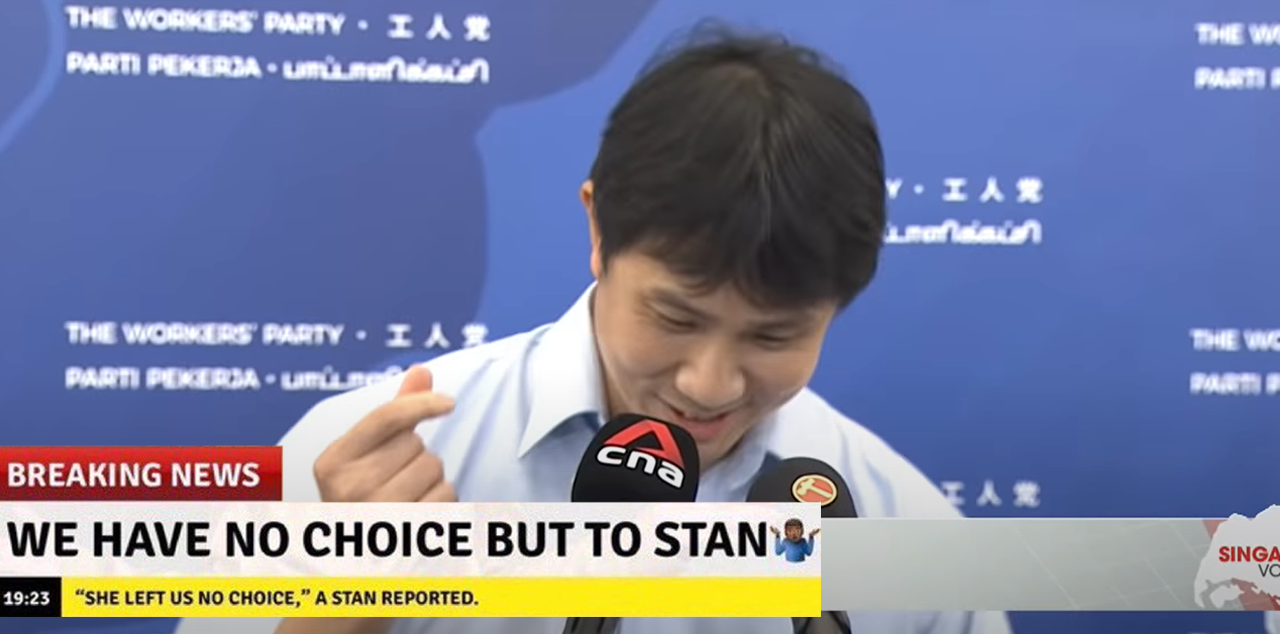Disclaimer: RICE does not endorse or support any political party in Singapore.
This election, calls of “hypebeast ah gong” and “Nicole jiejie” became commonplace. “Stan accounts” dedicated to political candidates are on the rise. People joke about simping for Jamus and call Raeesah Khan “queen” in the same way that Beyonce is crowned as one.
While most of this is treated as a joke—I, too, found all the fancams very entertaining—stanning politicians is dangerous.

In the United States, where Etsy has even sold prayer candles featuring Representative Alexandria Ocasio-Cortez, people have warned against stanning politicians.
While Singapore might not be near that level of politician worship (though you can buy Famous Jamus shirts), we must be self-aware enough to understand the pitfalls of stanning politicians.
Creating an idealised image of a politician puts them on an artificially high pedestal that prevents us from being critical about their competency as a politician. When people stan politicians, we end up reducing them to one or two dimensions: Jamus Lim for his charisma, for example. (Yes, people do acknowledge and discuss his proposed policies. But those are often overlooked in place of calling him “daddy”.)
Another prominent example is our “hypebeast ah gong”, Tan Cheng Bock. The 80-year old political veteran found a way to connect with younger voters, many of whom thought his simple acts of eating a flower or showing off his lense-less glasses were endearing.
Yet, how many of us critically analysed Progress Singapore Party’s manifesto, or questioned its policy proposals? We rallied around Tan Cheng Bock because we found his antics adorable. But many of the party’s other candidates were largely overshadowed along the way.
We’re less able to keep politicians accountable when we concentrate our support on those singular aspects and forgive mistakes because, well, we stan.
But no politician is perfect, and seeing them through rose-tinted glasses prevents us from acknowledging that they will make mistakes along the way.
This is especially the case if they are new MPs, who need time and patience from the electorate to grow into their roles. Coming off the adrenaline of the campaign season, we need to moderate our expectations and look at how they take care of their constituents, and represent Singaporeans in Parliament over the course of the coming months, and years. They’re not just subjects of a fancam edit or members of a Kpop group—as politicians, they wield actual power and must be held accountable as elected leaders.
Furthermore, stanning a single candidate makes it that much harder to attribute success to the whole team.
The Workers’ Party team for Sengkang GRC, for example, does not just consist of Jamus Lim and Raeesah Khan, as some echo chambers would have you believe. There’s also Louis Chua and He Ting Ru, the latter of whom is actually the team leader. While He Ting Ru has received praise for her down-to-earth personality, the fanfare surrounding Jamus and Raeesah far overshadowed the competency of the Sengkang GRC team as a whole.
This isn’t a new phenomenon—people have been simping for “Bae” Yam Keng since 2013—but stan culture has become especially prominent this election.
Social media was used much more, allowing stans to vocalise their support; in turn, stan culture became more visible. We’ve also come to place more importance on the overall likeability and charisma of our candidates. For instance, the PAP was mostly criticised for its arrogance and elitism, instead of being measured by the competence of their individual candidates.

However, stan language has a “die die must support or else” connotation to it. By projecting that kind of die-hard support, and framing this support as something that is mandatory, we might have a harder time assessing a politician’s flaws and limits, or adjusting our expectations along the way.
Yes, Singapore’s cult of worship for politicians is not that extensive or concrete. At least, not yet. But people continue to use stan language to describe their support for politicians, though the elections have ended. Politicians themselves are capitalising on it—Jamus has, at this point, used “cockles of my heart” a few too many times, and even threw out Korean oppa finger-hearts for fanservice—which might legitimise this culture of fan worship.
All this points to a very real possibility that stan culture might become a permanent fixture of Singapore’s political scene.
In the end, it’s not a bad thing to support a politician, nor to voice our support. But we must be careful about treading the line between enthusiastic endorsement and blind, obsessive loyalty.
Stanning politicians turns them into celebrities, not elected leaders, and the political arena could do with less drama.
Have a lead for a GE related story? Send it to community@ricemedia.co.






